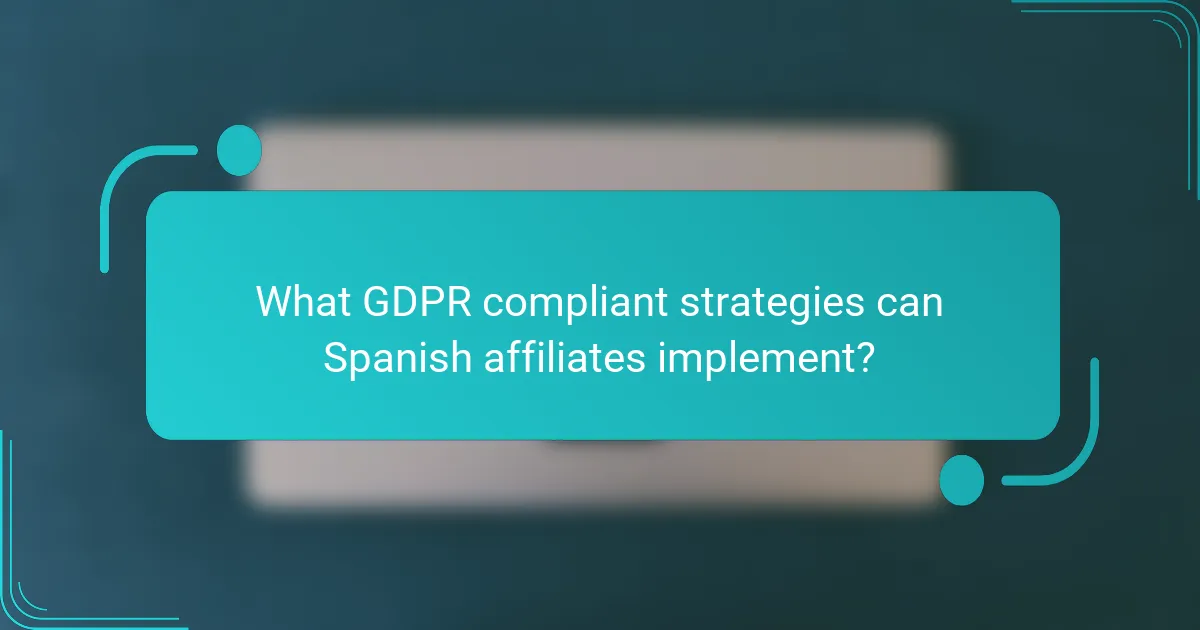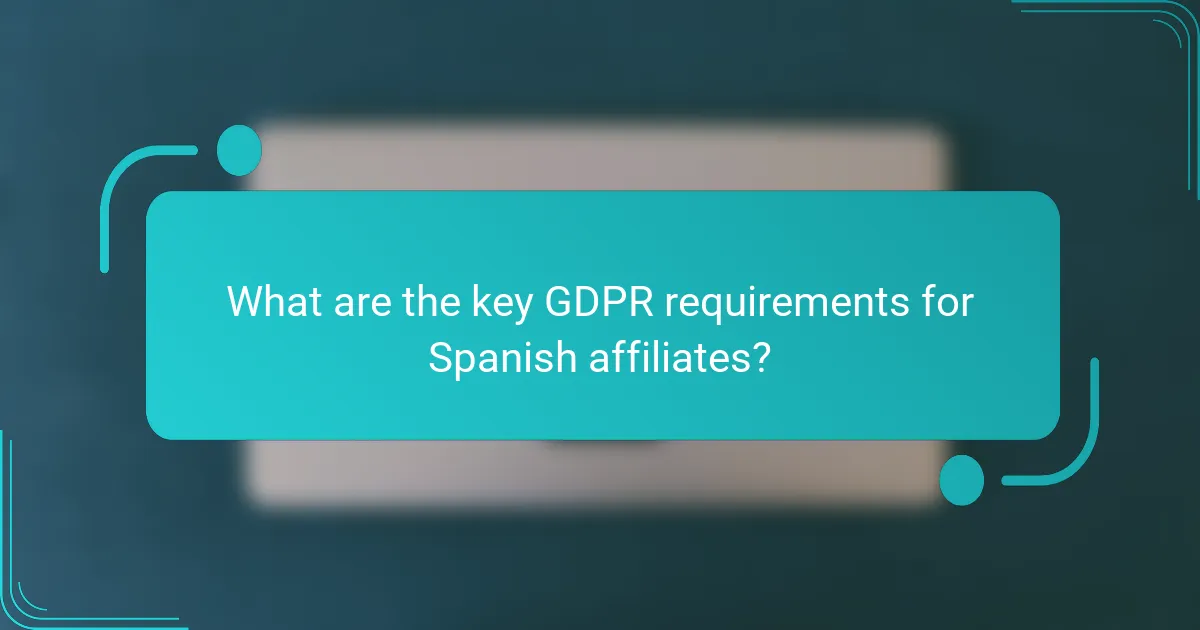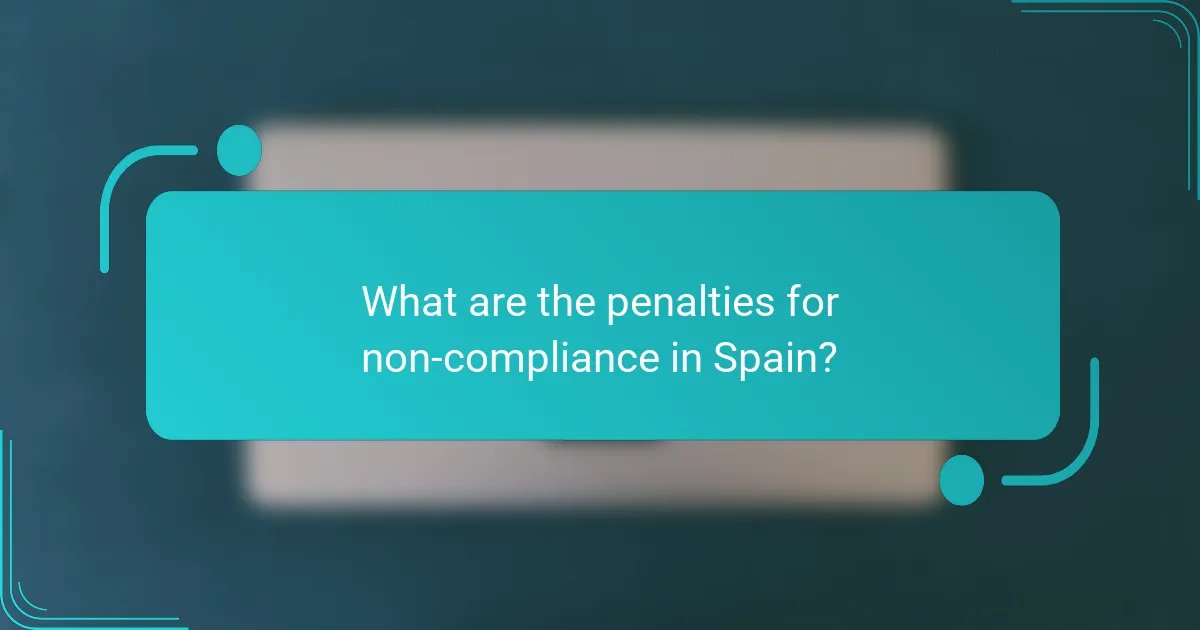Implementing GDPR compliant strategies is crucial for Spanish affiliates to manage personal data responsibly and avoid penalties. By focusing on user consent, data encryption, and clear privacy policies, these affiliates can build trust while ensuring compliance with regulations. Establishing robust data processing agreements and accountability measures further strengthens their commitment to protecting user information.

What GDPR compliant strategies can Spanish affiliates implement?
Spanish affiliates can implement several GDPR compliant strategies to ensure they handle personal data responsibly. Key strategies include employing data encryption methods, managing user consent effectively, updating privacy policies, and establishing data breach response plans.
Data encryption methods
Data encryption is crucial for protecting sensitive information from unauthorized access. Spanish affiliates should use strong encryption standards, such as AES-256, to safeguard personal data both in transit and at rest. This ensures that even if data is intercepted, it remains unreadable without the proper decryption key.
Consider implementing end-to-end encryption for communications and utilizing secure protocols like HTTPS for web traffic. Regularly review and update encryption methods to keep pace with evolving security threats.
User consent management tools
Effective user consent management is essential for GDPR compliance. Spanish affiliates should utilize consent management platforms (CMPs) that allow users to easily give, withdraw, or modify their consent regarding data processing. This transparency builds trust and ensures compliance with GDPR requirements.
When selecting a CMP, look for features such as customizable consent banners, detailed consent records, and integration capabilities with existing systems. Regularly audit consent practices to ensure they align with current regulations and user expectations.
Privacy policy updates
Updating privacy policies is a key step for Spanish affiliates to comply with GDPR. Policies should clearly outline how personal data is collected, used, and stored, as well as the rights users have regarding their data. Ensure that the language is straightforward and accessible to all users.
Regularly review and revise privacy policies to reflect any changes in data processing activities or legal requirements. Make these updates easily accessible on your website, and notify users of significant changes to maintain transparency.
Data breach response plans
Having a robust data breach response plan is vital for Spanish affiliates to mitigate risks associated with data breaches. This plan should outline immediate actions to take in the event of a breach, including notifying affected individuals and relevant authorities within the required 72 hours.
Regularly conduct drills to ensure all team members understand their roles in the event of a breach. Additionally, consider implementing monitoring tools to detect potential breaches early, allowing for a quicker response and minimizing potential damage.

How can Spanish affiliates ensure user consent?
Spanish affiliates can ensure user consent by implementing clear opt-in processes, using straightforward language, and maintaining robust tracking systems. These strategies help comply with GDPR requirements while building trust with users.
Opt-in forms
Opt-in forms are essential for obtaining explicit consent from users. Affiliates should design forms that are easy to understand and accessible, ensuring users can easily provide their consent before any data collection occurs. Consider using checkboxes that are unchecked by default to encourage active participation.
It’s beneficial to place these forms prominently on websites or during the registration process. This visibility increases the likelihood of users engaging with the consent request, thereby improving compliance rates.
Clear consent language
Using clear consent language is crucial for ensuring users understand what they are agreeing to. Avoid legal jargon and instead use simple, direct terms that explain what data will be collected and how it will be used. For example, instead of saying “data processing,” use “we will use your data to send you promotional emails.”
Additionally, consider providing examples of the types of communications users can expect. This transparency helps users make informed decisions and fosters trust in your brand.
Consent tracking systems
Implementing consent tracking systems is vital for managing user permissions effectively. These systems should log when and how consent was obtained, allowing affiliates to demonstrate compliance with GDPR regulations. Regular audits of these records can help identify any gaps in consent management.
Using automated tools can streamline this process, ensuring that consent records are updated in real-time. This not only simplifies compliance but also enhances user experience by allowing easy withdrawal of consent when desired.

What are the key GDPR requirements for Spanish affiliates?
Spanish affiliates must adhere to several key GDPR requirements, which include ensuring data subject rights, establishing data processing agreements, and implementing accountability measures. Compliance is essential to protect personal data and avoid significant fines.
Data subject rights
Under GDPR, individuals have specific rights regarding their personal data, including the right to access, rectify, erase, restrict processing, and object to processing. Spanish affiliates must ensure that they can facilitate these rights effectively and within the stipulated timeframes, typically one month.
To comply, affiliates should have clear procedures in place for handling requests from data subjects. For example, they might use standardized forms to streamline the process and ensure all necessary information is collected to verify identities.
Data processing agreements
Data processing agreements (DPAs) are essential contracts between data controllers and processors that outline the terms of data handling. Spanish affiliates must ensure that any third-party vendors or partners processing personal data on their behalf sign a DPA that meets GDPR standards.
Key elements of a DPA include the purpose of data processing, security measures, and the rights and obligations of both parties. Affiliates should regularly review these agreements to ensure they remain compliant with any changes in regulations or business practices.
Accountability measures
Accountability under GDPR requires Spanish affiliates to demonstrate compliance through documentation and proactive measures. This includes maintaining records of processing activities and conducting regular data protection impact assessments (DPIAs) when necessary.
Affiliates should implement training programs for employees on data protection principles and establish a clear data breach response plan. Regular audits can help identify vulnerabilities and ensure that all practices align with GDPR requirements, minimizing the risk of non-compliance penalties.

What tools can help with GDPR compliance?
Several tools can assist Spanish affiliates in achieving GDPR compliance by managing data privacy and protection effectively. These tools streamline processes related to consent management, data mapping, and compliance reporting, ensuring that businesses adhere to the regulations set forth by the GDPR.
OneTrust
OneTrust is a comprehensive privacy management platform that helps organizations comply with GDPR by providing tools for data mapping, risk assessments, and consent management. It offers a user-friendly interface that allows businesses to automate their compliance processes and maintain records of data processing activities.
OneTrust also includes features for managing vendor risk and conducting privacy impact assessments, which are essential for identifying potential compliance issues. For Spanish affiliates, leveraging OneTrust can simplify the complexities of GDPR compliance while ensuring that all necessary documentation is in place.
TrustArc
TrustArc offers a suite of privacy compliance solutions that cater to GDPR requirements, including assessments, audits, and ongoing monitoring. Its platform enables organizations to evaluate their data practices and implement necessary changes to align with GDPR standards.
One of the key advantages of TrustArc is its ability to provide customizable compliance frameworks tailored to specific business needs. Spanish affiliates can benefit from its robust reporting tools, which help demonstrate compliance efforts to stakeholders and regulators.
Cookiebot
Cookiebot specializes in cookie consent management, ensuring that websites comply with GDPR’s requirements for user consent. It automatically scans websites to identify cookies and provides clear consent banners to users, allowing them to manage their preferences easily.
For Spanish affiliates, Cookiebot simplifies the process of obtaining and managing consent from users, which is crucial for compliance. The tool also offers detailed reports on user consent, helping businesses maintain transparency and accountability in their data practices.

How can affiliates conduct GDPR audits?
Affiliates can conduct GDPR audits by systematically reviewing their data processing activities to ensure compliance with the General Data Protection Regulation. This involves assessing how personal data is collected, stored, and used, as well as identifying any potential risks to data subjects’ rights.
Data mapping techniques
Data mapping techniques involve creating a visual representation of data flows within an organization. This helps affiliates understand where personal data originates, how it is processed, and where it is stored. A common approach is to use flowcharts or diagrams that outline data sources, processing activities, and data storage locations.
When mapping data, affiliates should consider categorizing data types, such as contact information, payment details, and user preferences. This categorization aids in identifying specific compliance requirements for each data type under GDPR.
Risk assessment frameworks
Risk assessment frameworks provide structured methodologies for evaluating the risks associated with data processing activities. Affiliates can use frameworks like the ISO 27001 or NIST Cybersecurity Framework to identify vulnerabilities and assess the potential impact on data subjects.
During the risk assessment, affiliates should focus on identifying high-risk processing activities, such as those involving sensitive personal data or large-scale data processing. Regularly updating the risk assessment is crucial to adapt to changes in data processing practices or regulatory requirements.

What are the penalties for non-compliance in Spain?
In Spain, non-compliance with GDPR can lead to significant penalties, including hefty fines and reputational damage. Organizations must adhere to data protection regulations to avoid these serious consequences.
Fines up to €20 million
GDPR violations in Spain can result in fines reaching up to €20 million or 4% of a company’s global annual turnover, whichever is higher. This means that even small businesses can face substantial financial penalties if they fail to comply with data protection laws.
To mitigate the risk of fines, companies should conduct regular audits of their data processing activities, ensure proper consent mechanisms are in place, and maintain transparent privacy policies. Investing in GDPR training for employees can also help minimize the likelihood of violations.
Reputational damage
Non-compliance with GDPR can severely damage an organization’s reputation, leading to loss of customer trust and loyalty. Negative publicity from data breaches or regulatory actions can deter potential customers and partners, impacting long-term business viability.
To protect their reputation, companies should prioritize data protection and transparency. Proactively communicating about data handling practices and promptly addressing any breaches can help maintain public confidence and demonstrate a commitment to compliance.

How can affiliates educate their users about GDPR?
Affiliates can educate their users about GDPR by providing clear information on data protection rights and practices. This involves creating accessible resources that explain how personal data is collected, used, and stored, ensuring users understand their rights under the regulation.
Provide Clear Information on Data Rights
Affiliates should clearly outline users’ rights under GDPR, such as the right to access, rectify, and erase personal data. This information can be presented through dedicated web pages, FAQs, or informative blog posts. Using straightforward language helps users grasp their rights without confusion.
Utilize Consent Mechanisms
Implementing transparent consent mechanisms is essential for GDPR compliance. Affiliates can use opt-in forms that clearly state what data is being collected and for what purpose. This not only builds trust but also ensures users are fully informed before agreeing to data collection.
Offer Educational Resources
Creating educational resources, such as guides or webinars, can significantly enhance user understanding of GDPR. These materials should cover topics like data security, privacy settings, and the implications of data sharing. Affiliates can also include case studies to illustrate best practices.
Regularly Update Users
Keeping users informed about changes in data protection policies is crucial. Affiliates should send periodic updates via email or notifications to ensure users are aware of any modifications to data handling practices. This proactive approach fosters transparency and compliance.
